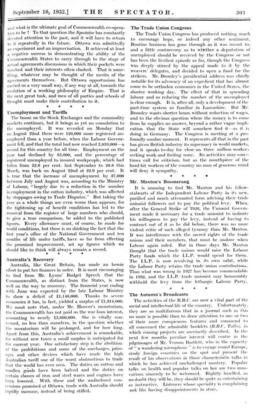The Trade Union Congress The Trade Union Congress has produced
nothing much to encourage hope, or indeed any other sentiment.
Routine business has gone through as it was meant to, and a little controversy as to whether a deputation of unemployed should be received by the Congress or not has been the liveliest episode so far, though the Congress was deeply stirred by the appeal made to it by the weavers' delegates, and decided to open a fund for the strikers. Mr. Bromley's presidential address was chiefly notable for its advocacy of an expedient that has almost come to be orthodox economies in the United States, the Shorter working day. The effect of that in spreading labour and So reducing the number of the unemployed is clear enough. It is, after all, only a development of the part-time system so familiar in Lancashire. But Mr: Bromley wants shorter hours without reduction of wages, and to the obvious question where the money is to come from he supplies no answer, beyond a rather vague impli- cation that the State will somehow find it—as it is doing in Germany. The Congress is meeting at a pro- foundly Sombre moment. It represents all that in the past has given British industry its supremacy in world markets, and it speaks to-day for close on three million worker.; seeking work and finding none. Its activities may som?- times Call for criticism, but as the mouthpiece of the hard-hit workers of the country no man of generous mind will deny it sympathy.






























 Previous page
Previous page